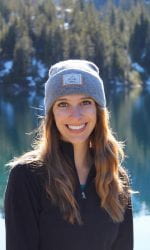Lindsey Warner
 Lindsey Warner, Graduate Student, UW Department of Immunology
Lindsey Warner, Graduate Student, UW Department of Immunology
Year Joined: 2018
Email: lindswar@uw.edu
UW Box: 358059
Lab: Stetson Lab
Why I chose UW Immunology
My prior mentors trained at UW, so naturally I was interested in the program and knew its impressive track record. Ultimately, I chose UW because the camaraderie and work-life balance among students was important to me. Apart from the science, I had always wanted to live in Seattle and knew this would be a great opportunity.
Activities and Interests
Seattle is artsy, eclectic, full of nature enthusiasts, and caters to many of my interests! I love everything from backpacking and alpine climbing to salsa dancing and gardening. In the winter, I spend most weekends snowboarding! Otherwise, I enjoy the local breweries, the music scene, hockey, and riding my bike around the city.
Advice from me
Keep in mind that applying to grad school is a two-way street. Any program worth your time will reciprocate your efforts. People in our department are always happy to share advice with past, present, and future trainees. Don’t be afraid to reach out!